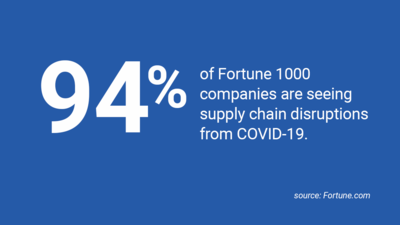
Bottom Line Up Front
- COVID-19 represents a significant risk to individuals and businesses around the world.
- Business operations have been disrupted on a global scale, creating an economic emergency.
- Supply chain resilience is one key to mitigating the current disruption, as well as preparing for future ones.
- Platforms that enable intelligence and end-to-end transparency are necessary to achieve such resilience.
COVID-19 has profoundly disrupted operations across the globe, which will undoubtedly have a prolonged impact on business continuity in almost every industry. Supply chain leaders, in particular, are discovering how critical it is that they increase resilience and strengthen their operations in order to be better prepared for future disruptive events.
High-impact, anomalous events like the outbreak of COVID-19 cannot be planned for in the same way traditional supply-and-demand fluctuations can be. However, today's technology can help supply chain managers anticipate and adapt to the unexpected.
Supply chain resilience involves the ability to mitigate risk in the short term, but it also requires the flexibility to make immediate, strategic adjustments in times of turmoil. Those companies that can combine powerful, AI-driven data analytics with blockchain-powered end-to-end transparency stand to not only survive during global crises, but potentially even gain a competitive advantage.
For example, applications that analyze data using machine learning have been proven to generate accurate predictions and actionable insights in a variety of use cases. Even in circumstances as unusual as the current pandemic, a system designed to evaluate supply and demand in real time and automatically make adjustments would be invaluable.
Merge such results with fully transparent supply chain data housed on an immutable distributed ledger, and the entire process becomes a self-correcting solution that enhances operations when things are status quo and seamlessly gets goods, including medical supplies, to the areas and individuals who need them most during a crisis.
The right combination of big data analytics, automation, and robotics may also alleviate immediate bottlenecks, while machine learning capabilities can be leveraged to enhance workflows between automation and humans. Modern data analytics powered by blockchain and machine learning can enable transparency and help organizations harness their data to identify new opportunities. That, in turn, leads to smarter business moves, more efficient operations, higher profits, and resilience to the next disruption.
Are you ready to reimagine your supply chain?
